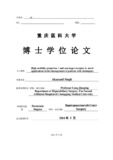Please use this identifier to cite or link to this item:
http://archive.nnl.gov.np:8080/handle/123456789/419| Title: | High-mobility group box 1 and scavenger receptor A: novel applications in the management of patients with cholangitis |
| Authors: | Singh, Akanand |
| Keywords: | Acute obstructive Cholangitis HMGB1 Interleukin-10 TNF-alpha Sepsis Inflammation Scavenger Receptor A Endotoxemia Cytokine EndotoxinHepatic Injury |
| Issue Date: | 20-Feb-2018 |
| Abstract: | Cholangitis is the inflammation of biliary ducts which usually begins extra-hepatic and easily spreads intra-hepatic, causing bacteremia. Acute obstruction of biliary tract with the presence of pus is severe form of cholangitis know as Acute Obstructive Suppurative Cholangitis (AOSC) which has very high mortality. It is experienced that the Charcot’s triad and Reynold pentad are difficult to use in clinical practice for the management of cholangitis and recently published “Updated Tokyo Guidelines for management of cholangitis and cholecystitis in 2013 is lack of evaluation and revision. High Mobility Group Box 1 (HMGB1) is a proinflammatory cytokine which is found to play an active role during the pathogenesis of inflammatory processes. In response to infection, HMGB1 acts as an important proinflammatory cytokine which may lead in the damage of cells and tissues. This process may continue to metabolic acidosis, multi-organ dysfunction syndrome (MODS) and sepsis. Recent studies have reported associations between HMGB1 and inflammation. But the correlation between HMGB1 and AOSC pathogenesis is not yet fully understood. We detect whether HMGB1 is involved in the pathogenesis of AOSC. |
| Description: | Doctorate degree, Hepatopancreatobiliary Surgery,2016. |
| URI: | http://103.69.125.248:8080/xmlui/handle/123456789/419 |
| Appears in Collections: | 600 Technology (Applied sciences) |
Files in This Item:
| File | Description | Size | Format | |
|---|---|---|---|---|
| Akanand_Singh_phd_thesis.pdf | 4.88 MB | Adobe PDF |  View/Open |
Items in DSpace are protected by copyright, with all rights reserved, unless otherwise indicated.